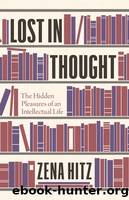Lost in Thought: The Hidden Pleasures of an Intellectual Life by Hitz Zena

Author:Hitz, Zena [Hitz, Zena]
Language: eng
Format: epub
Tags: Philosophy, Psychology, Self Help, Religion
ISBN: 9780691178714
Amazon: 0691178712
Goodreads: 48710541
Publisher: Princeton University Press
Published: 2020-01-01T08:00:00+00:00
CHAPTER 2
Learning Lost and Found
Action is the pointer of the balance. One must not touch the pointer, but the weights.
âSIMONE WEIL, GRAVITY AND GRACE, TRANS. ARTHUR WILLS
My weight is my love.
âAUGUSTINE, CONFESSIONS
Intellectual Life and the Human Heart
The world that we have sought to escape has turned out to dwell within our hearts. To exercise the love of learning in all of its splendor, we must allow it to discipline and put in order our other motivations, by interior war or interior peacemaking. Intellectual life turns out to be a form of asceticism, a cultivation of ourselves that involves uprooting and drying up parts of ourselves as much as it requires sunlight, soil, and seed.
Asceticism is required because learning does not dwell only in rarified realms to which one could travel, as one might go to the Himalayas or to Hawaii. It is a part of the social world, participates in that worldâs vices, and provides its own obstacles. Our intellectual institutions provide occasions not only to exercise the love of learning but also to advance ourselves in wealth and status. So they tap into loves other than the love of learning, and can form intellectuals for whom learning is a tangential goal. Some corrupted habits of the mind can even turn us against learning itself.
The examples from the first chapter of this book are likely to look rarified and strange to us. What gives them exclusive power to define intellectual life? We know other lives of learning, ones mixed with ambition and success. We are likely to hear that studying the liberal arts is the best route to success in business, as modeled by Steve Jobs or Bill Gates. We know stories of intellectuals whose learning has so alienated them from common matters of human life that they become abrasive at best, cruel at worst. Earlier, I mentioned the semifictional Martin Eden, who through intensive reading isolates himself from every other human being, including the woman he loves. We have also the example of Fritz Haber, and many like him, who have used their intellectual talents for human destruction.
A catalog of examples, parallel to the first, of how intellectual life goes wrong will not be enough to complete the picture. If I am to persuade you that my images of learning for its own sakeâinward, withdrawn, disclosing dignity, linked to the heart of humanityâare an appropriate ideal, I will need not only to diagnose common intellectual illnesses but also to describe pathways to and from the good and the bad forms of intellectual life. In other words, I need to tell compelling stories of corruption and redemption.
Download
This site does not store any files on its server. We only index and link to content provided by other sites. Please contact the content providers to delete copyright contents if any and email us, we'll remove relevant links or contents immediately.
The remains of the day by Kazuo Ishiguro(8999)
Tools of Titans by Timothy Ferriss(8396)
Giovanni's Room by James Baldwin(7346)
The Black Swan by Nassim Nicholas Taleb(7129)
Inner Engineering: A Yogi's Guide to Joy by Sadhguru(6794)
The Way of Zen by Alan W. Watts(6614)
The Power of Now: A Guide to Spiritual Enlightenment by Eckhart Tolle(5781)
Asking the Right Questions: A Guide to Critical Thinking by M. Neil Browne & Stuart M. Keeley(5775)
The Six Wives Of Henry VIII (WOMEN IN HISTORY) by Fraser Antonia(5515)
Astrophysics for People in a Hurry by Neil DeGrasse Tyson(5190)
Housekeeping by Marilynne Robinson(4447)
12 Rules for Life by Jordan B. Peterson(4304)
Ikigai by Héctor García & Francesc Miralles(4274)
Double Down (Diary of a Wimpy Kid Book 11) by Jeff Kinney(4272)
The Ethical Slut by Janet W. Hardy(4253)
Skin in the Game by Nassim Nicholas Taleb(4248)
The Art of Happiness by The Dalai Lama(4130)
Skin in the Game: Hidden Asymmetries in Daily Life by Nassim Nicholas Taleb(4006)
Walking by Henry David Thoreau(3962)
